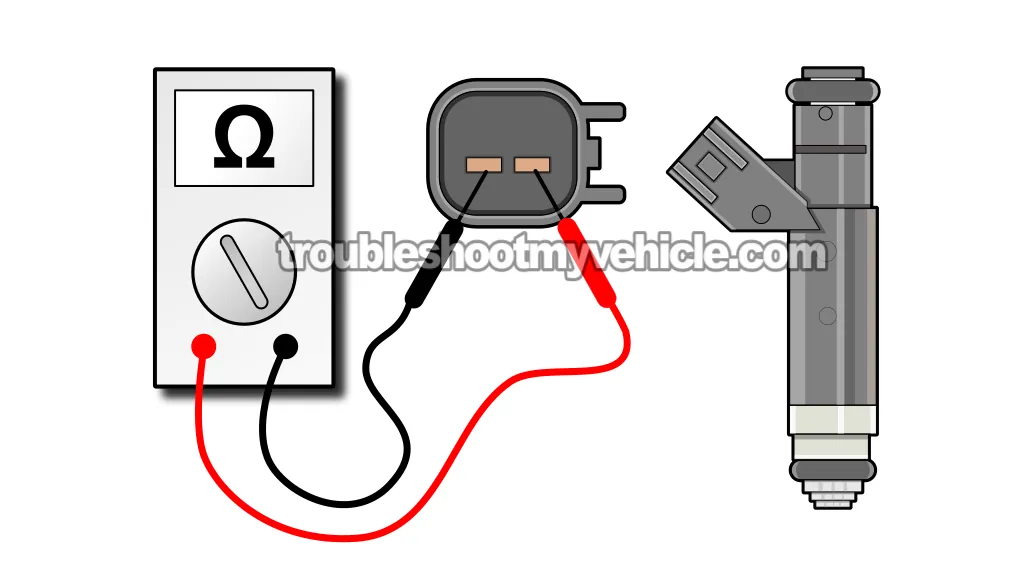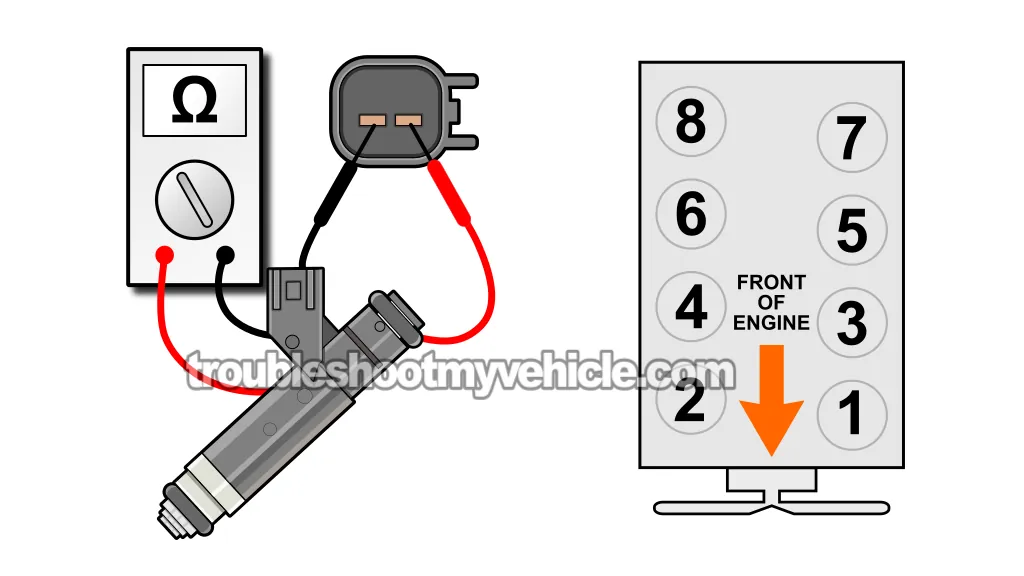
In this this tutorial, I'll show you one of the ways to test for a bad fuel injector by doing a fuel injector resistance test.
Since the 4.7L V8 engine is equipped with 8 fuel injectors, I'll also show you a specific diagnostic strategy you can use to find the clogged or bad fuel injectors.
Contents of this tutorial:
APPLIES TO: This tutorial applies to the following vehicles:
- 4.7L V8 Dodge Ram 1500 Pickup: 2000, 2001, 2002, 2003, 2004, 2005, 2006, 2007, 2008, 2009.
WIRING DIAGRAMS:
- Fuel Injector Circuit Wiring Diagram (2002 4.7L V8 Dodge Ram Pickup).
- Fuel Injector Circuit Wiring Diagram (2003 4.7L V8 Dodge Ram Pickup).
- Fuel Injector Circuit Wiring Diagram (2004-2005 4.7L V8 Dodge Ram 15000 Pickup).
- Fuel Injector Circuit Wiring Diagram (2006 4.7L V8 Dodge Ram Pickup).
- Fuel Injector Circuit Wiring Diagram (2007-2008 4.7L V8 Dodge Ram Pickup).
- Fuel Injector Circuit Wiring Diagram (2009 4.7L V8 Dodge Ram Pickup).
CYLINDER MISFIRE DIAGNOSTICS::
INJECTOR SPRAY PATTERN TEST:
Symptoms Of A Bad Fuel Injector
The three most common ways that a fuel injector fails are:
- The fuel injector fries internally and won't spray any fuel.
- The fuel injector gets clogged with deposits and won't spray enough fuel or in the proper spray pattern.
- The fuel injector doesn't activate (spray) because it's missing power or it's switching signal and won't inject fuel at all.
No matter what the root cause, a bad fuel injector will cause the engine to idle rough and miss when you accelerate it down the road.
What throws a ‘wrench into the works’, is that the PCM won't always set a specific fuel injector trouble code. But if it does, you'll see one of the following:
- P0201: Injector #1 Control Circuit.
- P0202: Injector #2 Control Circuit.
- P0203: Injector #3 Control Circuit.
- P0204: Injector #4 Control Circuit.
- P0205: Injector #5 Control Circuit.
- P0206: Injector #6 Control Circuit.
- P0207: Injector #7 Control Circuit.
- P0208: Injector #8 Control Circuit.
From personal experience, I can tell you that around 90% of the time, when you do have a bad fuel injector, you'll see a misfire trouble code:
- P0301: Cylinder #1 Misfire.
- P0302: Cylinder #2 Misfire.
- P0303: Cylinder #3 Misfire.
- P0304: Cylinder #4 Misfire.
- P0305: Cylinder #5 Misfire.
- P0306: Cylinder #6 Misfire.
- P0307: Cylinder #7 Misfire.
- P0308: Cylinder #8 Misfire.
And well, the other symptoms your vehicle may experience are:
- Lack of power.
- Bad gas mileage.
- Check engine light (CEL) is on.
What Tools Do I Need To Test The Fuel Injectors?
To do a fuel injector resistance test, you don't need a whole lot of stuff, since the most important tool you'll need is a multimeter (which can either be an analog multimeter or a digital multimeter).
Here's a basic list of tools you'll need:
- A multimeter.
- You'll only be using the multimeter to check resistance (Ohms).
- If you need to upgrade or buy a multimeter, check out my recommendation: Tekpower TP8268 AC/DC Auto/Manual Range Digital Multimeter (at: amazon.com).
- Scan tool.
- To actually test the fuel injectors, you don't need a scan tool (since a scan tool can't dynamically test the fuel injectors). But, having one makes the whole process easier since you're able to retrieve any diagnostic trouble codes (DTCs) stored in the PCM memory.
- Don't have one? Check out my recommendation: ZM301 OBD2 Scanner Diagnostic Tool (at: amazon.com).
- Pen and Paper to write down your fuel injector resistance test results.
Where To Buy The Fuel Injectors And Save
You can the fuel injectors at your local auto parts store, or you could buy them online and save a few bucks.
I've gotten so used to buying almost everything online now, for your info and shopping comparison, below you can find the links to find out more about them.
When you click on the link (for the injector below) and get to the page, you'll be asked to enter your vehicle's info to make sure the injector fits your application. If it doesn't, you'll be asked a few more questions about your vehicle and then you'll be taken to the right fuel injector:
Disclosure: As an Amazon Associate, I earn from qualifying purchases. If my tutorials help you, using these links is an easy way to support the site at no extra cost to you. Thank you!
The Fuel Injector Test

There's a good chance that you already have one (or several) specific fuel injector you want to test or you don't know where to start.
If you want to test just one fuel injector or several, this will be your starting point. If you don't know where to start, I suggest you do a cylinder balance test to find out which cylinder is the one that's ‘dead’ and could possibly have a bad fuel injector.
If possible, do the fuel injector resistance test with a slightly warmed up. If your Dodge or Jeep SUV or pickup has been running for a while and it's hot, let it cool down for about an hour. If it's completely cold, crank up the engine and let it warm up for about 20 minutes.
Although having the engine warmed up helps to get a more accurate snapshot of the condition of the fuel injectors, it's not that critical.
So, if you have already removed the fuel injector or fuel injectors, or the vehicle cranks but does not start, etc., you don't have to install the fuel injectors and start the engine to warm her up. You can test them cold (and off of the vehicle).
Alright, here are the steps:
- 1
Unplug the fuel injector from its electrical connector.
NOTE: Disconnect the one that you suspect is bad and at least 2 others.
You can test all of the fuel injectors if you want or need. - 2
Place your multimeter Ohms mode.
- 3
Probe the fuel injector's two male spade terminals with the multimeter test leads.
In case you're wondering, it doesn't matter which test lead (black or red) you use on which terminal on the fuel injector, since the polarity doesn't matter in a simple resistance test. - 4
Write down the Ohms (resistance) value that your multimeter is registering on a piece of paper. Write down what engine cylinder that fuel injector belongs to, too.
- 5
Now, repeat the above steps on the remaining or other 2 fuel injectors.
Here's what your test result means:
Before taking a look at what your results mean, I want to tell you that it's normal for the fuel injector resistances to vary a bit. For example, if you were to get the following resistances:
- 13.5 Ω for Injector #1
- 14.5 Ω for Injector #2
- 13.9 Ω for Injector #3
The difference in the above resistance values would be normal since they are small and not drastic (the values are hypothetical and won't reflect what you'll get on your particular vehicle).
What would accuse the fuel injector as being bad would be if the following values were recorded:
- 2.5 Ω for Injector #1
- 14.6 Ω for Injector #2
- 13.9 Ω for Injector #3
The resistance for injector #1 would be a dead give away that it's fried because its resistance value is way too radically different from the rest.
OK, choose from one of the following test results:
CASE 1: All tested fuel injectors registered about the same resistance values. This confirms that the fuel injector you're testing is OK internally.
However, the injector could still be clogged and causing a cylinder misfire —or the misfire could be due to something else entirely.
I recommend checking the fuel injector's spray pattern. This tutorial will walk you through it:
Another helpful resource for tracking down the root cause of a cylinder misfire is this guide:
CASE 2: One or more injectors registered a completely different resistance value. This indicates that the fuel injector is bad. Replace the fuel injector.
Should I Test All Of The Fuel Injectors?
You don't have to test them all, if you don't have to. This is especially true if you have a repair manual for your specific 4.7L Dodge or Jeep SUV or pickup and that repair manual has the fuel injector resistance specification.
The main reason I suggest you test them all is to avoid having to search for the resistance value, either online or in a book. Now, don't get me wrong, the more info you have at your disposal, the better. But, if you test them all, you'll find out what the average Ohms value is without having to look it up.
I work in an automotive repair shop and sometimes our professional auto repair data information does not include the fuel injector resistances. So what I do is check at least 3 other fuel injectors, besides the one I suspect is bad, to get the average fuel injector resistance and go from there.


